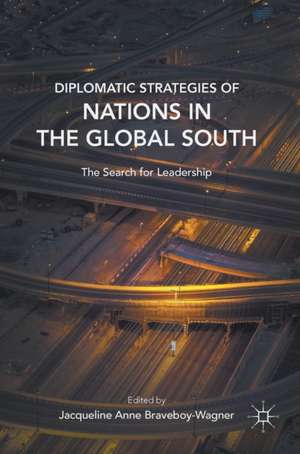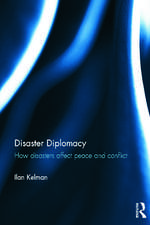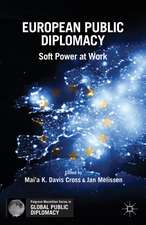Diplomatic Strategies of Nations in the Global South: The Search for Leadership
Editat de Jacqueline Braveboy-Wagneren Limba Engleză Hardback – 20 oct 2016
Preț: 953.82 lei
Preț vechi: 1163.20 lei
-18% Nou
Puncte Express: 1431
Preț estimativ în valută:
182.52€ • 191.04$ • 151.91£
182.52€ • 191.04$ • 151.91£
Carte tipărită la comandă
Livrare economică 31 martie-14 aprilie
Preluare comenzi: 021 569.72.76
Specificații
ISBN-13: 9781137452252
ISBN-10: 1137452250
Pagini: 485
Ilustrații: XV, 453 p. 2 illus.
Dimensiuni: 148 x 210 x 30 mm
Greutate: 0.69 kg
Ediția:2016
Editura: Palgrave Macmillan US
Colecția Palgrave Macmillan
Locul publicării:New York, United States
ISBN-10: 1137452250
Pagini: 485
Ilustrații: XV, 453 p. 2 illus.
Dimensiuni: 148 x 210 x 30 mm
Greutate: 0.69 kg
Ediția:2016
Editura: Palgrave Macmillan US
Colecția Palgrave Macmillan
Locul publicării:New York, United States
Cuprins
1. Introduction: Rise of Which Global South States?
Part One: Seeking Global Leadership
2. Brazil’s International Rise in the Twenty-First Century
3. Aspiring to be a Global Power: China’s Activism in the Global South
4. From Reluctance to Readiness: India ‘s Foreign Policy and Diplomatic Strategies in the Twenty-First Century
5. South Africa in Africa and the World: The Diplomatic Strategies of a Global-Regional Power
Part Two: Regional-Subregional Leaders
6. Egypt as a Leading Nation: Regional Imperatives and Domestic Constraints 7. Iran’s Permanent Quest for Regional Power Status
8. Nigeria’s Diplomacy: The Challenges of Regional Power and Leadership
in a Globalizing World
9. Uganda: A Mix of Strategies for Soft Power Goals
10. The Bolivarian Republic of Venezuela: Ideological Diplomacy and Regional
Leadership
Part Three: Seeking Subregional Leaderships
11. Incapacity, Endowment, and Ambivalence in Deciphering Azerbaijan’s Regional Leadership Strategy
12. Cuba: Still Punching Above Its Weight 13. Qatar’s Global Activism: Pursuing Ambition in the Midst of Domestic and Regional Transitions14. Senegal: A West African Leader in a Globalized World?
15. The Diplomacy of Singapore: Rationality and Pitfalls
16. Conclusion: Lessons Learned
Notă biografică
Jacqueline Braveboy-Wagner is Professor of Political Science at the City College and The Graduate School and University Center of the City University of New York, United States. She is a specialist in foreign policy, diplomacy, and related development issues, particularly with respect to small states (and specifically Caribbean states) as well as the nations of the global south in general. She has authored or edited ten books and numerous articles and is the founding chair of the Global South Caucus of the International Studies Association.
Textul de pe ultima copertă
At a time of change in the international system, this book examines how non-traditional leading nations from the Global South have fared to date and what the chances are of their rise to continue. In the second decade of the twenty-first century, the enthusiasm of observers of the international scene about the “rise of the rest” is waning as many countries that were expected to lead the evolving multipolar order are experiencing economic contraction and governance problems. In order to predict further developments, the contributors to this volume focus on the types and sources of the diplomatic strategies that must be executed by rising states if they are to preserve domestic advances as well as gain influence regionally and internationally. Through a comprehensive examination of case studies from Latin America, Africa, Asia, and the Middle East, they show that while there are commonalities among these rising states, unique domestic conditions, values, and traditions impact and predictdiplomatic strategizing and the ability for sustained projection on the international scene.
Caracteristici
Goes beyond the usual economically-oriented prognoses and offers an analysis of diplomatic strategies in the Global South Elaborates on the intimate linkage between unique domestic conditions, values, and traditions, and the diplomatic strategies states adopt to gain influence in international affairs Targets a wide audience beyond scholars and practitioners directly from the Global South to increase awareness of the political diplomatic, and economic potential of the regions











